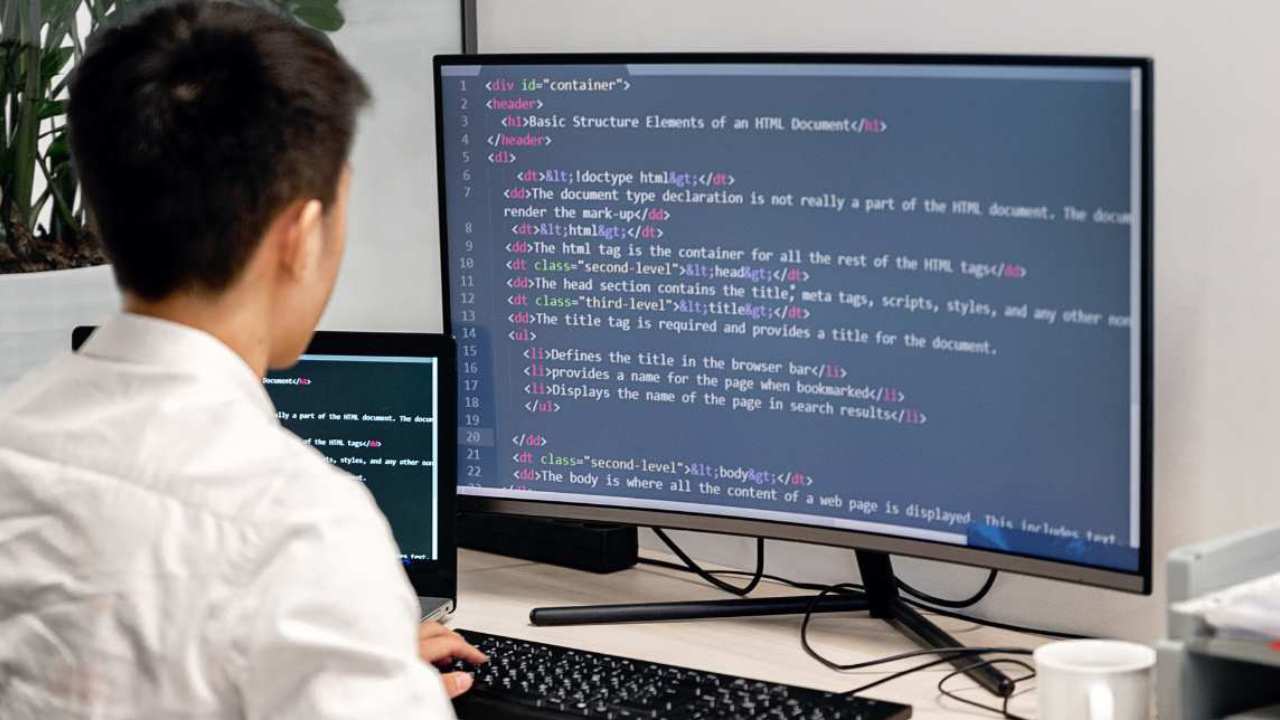Are you a business owner or a startup C-suite executive looking to expand your team and scale your operations? As your business grows, it becomes vital to delegate tasks and bring in skilled professionals who can contribute to your success. One crucial role that can make a significant impact on your online presence is that of a web developer.
However, a comprehensive web developer job description is crucial to ensure you hire the right talent from the pool of 450,000+ professionals in the US alone. This post outlines the different job duties, responsibilities, and requirements for different web developer positions. You’ll also see how CloudHire can assist in hiring a remote web developer that matches your requirements. But first, let’s kickstart by briefly summarizing a web developer’s roles.
Overview of the Web Developer Role
As a small business owner or a startup executive looking to hire a web developer, it’s crucial to understand their responsibilities and requirements. A web developer is a skilled professional who specializes in building and maintaining websites and web applications. They’re well-versed in various programming languages and are responsible for designing, coding, and testing websites to ensure optimal functionality and user experience.
A web developer job description usually requires some unique responsibilities that we’ll discuss in the next section.
Web Developer Job Description: 5 Key Responsibilities

To attract the right talent for your business, it’s essential to outline the key responsibilities of a web developer during the recruitment process.
Here are 5 primary responsibilities you can expect a web developer to handle:
- Building and maintaining websites
- Collaborating with stakeholders
- Designing and coding website content
- Testing and debugging
- Staying up-to-date with industry trends
1. Building and Maintaining Websites
A web developer’s primary responsibility is to develop and maintain websites for your business or startup. They use their expertise in programming languages such as HTML, CSS, and JavaScript to create visually appealing and functional websites that align with your brand image.
2. Collaborating with Stakeholders
Web developers work closely with stakeholders, including managers and clients, to understand their requirements and expectations. Effective communication and collaboration skills are essential for a web developer to ensure that the final product meets your business goals and satisfies your stakeholders.
3. Designing and Coding Website Content
Web developers are responsible for designing and coding website content, including text, images, and multimedia elements. They utilize their knowledge of user interface design and web standards to create engaging and user-friendly websites.
4. Testing and Debugging
Before launching a website, a web developer conducts thorough testing to ensure its functionality across different browsers and devices. They identify and fix any bugs or errors, ensuring a seamless user experience.
5. Staying Up-to-Date With Industry Trends
Web development is a rapidly evolving field, and it’s crucial for a web developer to keep abreast of the latest industry trends and technologies. They continuously expand their knowledge and skills to deliver cutting-edge solutions for your business.
Any web developer you plan on hiring should be able to fulfill the above responsibilities — this ensures you don’t waste resources going through a developer onboarding checklist on wrong hires. However, if you plan on hiring professionals with more extensive expertise, like a full-stack web developer, your web developer job description will need to include extra responsibilities and duties, as we’ll observe below.
Full-Stack Web Developer Job Description

Certain projects are beyond the expertise of an entry-level web developer. If you seek a professional who can handle the full software stack, then you should consider hiring a full-stack web developer. These experts possess a broad skill set and can handle both front-end and back-end development tasks, building and maintaining websites, software, applications, and databases.
Here are 2 major extra responsibilities to include in a full-stack web developer job description:
1. Front-End Development
Full-stack web developers excel in front-end development, which involves creating and implementing user interfaces, designing website layouts, and optimizing user experience. They have expertise in HTML, CSS, and JavaScript frameworks. (We’ll explore more on a front-end developer’s job description later.)
2. Back-End Development
Full-stack web developers are experts who are proficient in back-end development. They handle server-side programming, database management, and system integration. They’re familiar with languages like PHP, Python, and Ruby. (More on this soon.)
Depending on their project requirements, most businesses and startups niche down to either of these two roles when hiring a web developer. In this case, the web description will differ for the respective roles — continue reading to learn more!
Tip: If you require web developers with expertise in specific runtime environments like Node.js, check out our guide on how to hire a Node.js developer.
Front-End Web Developer Job Description

If you primarily need someone to focus on front-end development, consider hiring a front-end web developer.
Here are 3 key responsibilities to include in a front-end web developer job description:
- Creating user interface design
- Building responsive designs
- Ensuring cross-browser compatibility
1. Creating User Interface Design
Front-end web developers specialize in creating visually appealing and user-friendly interfaces. They have a deep understanding of user experience design principles and employ their skills to enhance the overall look and feel of a website.
2. Building Responsive Designs
With the increasing use of smartphones and mobile devices, front-end web developers should be proficient in responsive design. They ensure that websites adapt seamlessly to different screen sizes and devices, providing an optimal user experience across platforms.
3. Ensuring Cross-Browser Compatibility
Front-end web developers conduct extensive testing to ensure cross-browser compatibility. They ensure that websites function correctly across different web browsers, such as Chrome, Firefox, Safari, and Internet Explorer.
Back-End Web Developer Job Description

The list below encompasses the main responsibilities and tasks typically associated with a back-end web developer role:
- Develop and maintain server-side applications and databases.
- Collaborate with front-end developers to integrate front-end and back-end functionality.
- Write clean and efficient code in languages such as Python, Ruby, Java, or PHP.
- Design and implement scalable and secure APIs for web applications.
- Optimize code for performance and scalability.
- Create and maintain databases, including schema design, query optimization, and data migration.
- Implement data storage solutions such as relational databases (e.g., MySQL, PostgreSQL) or NoSQL databases (e.g., MongoDB, Redis).
- Ensure the security and integrity of data by implementing appropriate security measures.
- Collaborate with DevOps teams to deploy and manage web applications.
- Conduct unit testing and integration testing to ensure the reliability of back-end code.
- Troubleshoot and debug issues in production environments.
- Stay up-to-date with the latest industry trends and technologies in back-end development.
- Collaborate with cross-functional teams to gather requirements and provide technical guidance.
- Participate in code reviews and provide constructive feedback.
- Continuously optimize and enhance existing back-end systems.
- Implement caching mechanisms to improve application performance.
- Integrate third-party services and APIs into web applications.
- Monitor and analyze server logs and performance metrics to identify and resolve issues.
- Document technical specifications, API documentation, and system architecture.
- Collaborate with front-end developers, designers, and project managers to ensure seamless integration of front-end and back-end components.
Apart from the various roles we’ve discussed, there are additional roles in web development that you can consider including when writing a job description.
4 Other Roles in Web Development

Additional web development roles to consider when compiling a web description include:
- Web designer
- Web programmer
- Content developer
- Webmaster
Let’s explore their job description below.
1. Web Designer
If you intend to hire a professional with web design abilities, consider including the following responsibilities in your web developer job description:
- Designing visual elements that align with the brand identity and user experience goals.
- Creating wireframes and mockups of the website’s structure and layout.
- Implementing responsive design across different devices and screen sizes.
- Collaborating with stakeholders to understand the project requirements, gather feedback, and incorporate changes into the design.
- Optimizing for performance and usability to provide a seamless and intuitive user experience.
- Keeping up with design to ensure their work is modern and relevant.
- Working with design software like Adobe Photoshop, Sketch, or Figma to create and refine their designs.
2. Web Programmer
The web developer job description of a professional with web programming skills should include the following responsibilities:
- Writing and maintaining code using programming languages like HTML, CSS, JavaScript, PHP, Python, or Ruby.
- Developing web applications that interact with databases, handle user input, and perform various functions — may require a knowledge of runtime environments/systems, such as Node.js (and its advantages).
- Collaborating with web designers and developers to understand project requirements and implement the desired functionalities.
- Testing and debugging of websites and web applications to identify and resolve any bugs or issues.
- Implementing security measures to protect websites and web applications from potential vulnerabilities and cyber threats.
- Staying updated on industry trends, including new programming languages, frameworks, and tools.
3. Content Developer/Writer
The web developer job description of a content developer includes the following job duties and responsibilities:
- Creating engaging and informative content for websites.
- Conducting keyword research to identify relevant keywords and phrases that can improve the website’s visibility in search engine results.
- Develop content strategies and plans that align with the website’s objectives and target audience.
- Manage and organize website content, ensuring it’s properly structured, categorized, and tagged for easy navigation and searchability.
- Work closely with other members of the web development team.
- Monitor and analyze the performance of website content using analytics tools.
- Regularly reviewing and updating website content to ensure its accuracy, relevance, and freshness.
4. Webmaster
Often known as a jack-of-all-trades, webmasters are known to manage and maintain entire websites.
A web developer job description for a webmaster will typically include the following job responsibilities:
- Overall maintenance and upkeep of a website.
- Oversee the creation, editing, and publishing of website content.
- Implement updates and improvements to the website.
- Analyze website analytics to track key performance metrics.
- Optimize the website’s structure, content, and meta tags to improve its visibility and rankings in search engine results.
- Implement security measures to protect the website from potential threats and vulnerabilities.
Once you’ve compiled the right job description tailored to the particular web developer role you intend to fill, there are specific skills to look out for in candidates. We’ll explore them in the next section.
4 Required Skills and Qualifications for Web Developers

When hiring a web developer, it’s essential to look for candidates with specific skills and qualifications.
Here are 4 key attributes to consider:
- Technical expertise
- Problem-solving and organizational skills
- Strong attention to detail
- Continuous learning
1. Technical Expertise
A web developer should possess a strong technical background, including proficiency in programming languages like HTML, CSS, JavaScript, and various web services and frameworks. They should also be familiar with content management systems like WordPress and Drupal.
2. Problem-solving and Organizational Skills
Web developers often face complex issues that demand innovative problem-solving skills. The right candidate should be able to think critically and find creative solutions to address technical issues. Additionally, organizational skills are crucial for managing multiple projects and meeting deadlines.
3. Strong Attention to Detail
The ability to pay close attention to detail is essential for web developers. They should have an eye for design and ensure that every element of a website is visually appealing and error-free.
4. Continuous Learning
Given the fast-paced nature of web development, a web developer should have a passion for continuous learning. They should be eager to keep up with the latest industry trends, attend relevant conferences and workshops, and invest in their professional growth.
While looking out for these skills can guide your hiring decisions, what else do you need to do to attract the right developer? Is a comprehensive job description all that matters is hiring the right talent? Continue reading to learn more.
4 Tips for Attracting the Right Web Developers

A comprehensive web developer job description is crucial, but hiring the right professional for your business or startup goes beyond compiling a list of job duties and responsibilities.
Here are 4 hiring strategies and tips to make your job posting stand out:
- Partner with a talent search and staffing platform (CloudHire).
- Highlight exciting projects and innovations.
- Emphasize growth opportunities.
- Provide competitive compensation and benefits.
1. Partner with a talent search and staffing platform (CloudHire).
CloudHire is your trusted partner in hiring a remote web developer for your business or startup. Our platform connects you with top talent and streamlines your hiring process. With our extensive talent search database and user-friendly interface, you can easily find the perfect fit for your organization.
2. Highlight exciting projects and innovations.
Mention any exciting projects or technological innovations that your business has been working on. Showcase your commitment to staying ahead of the curve and creating a dynamic work environment.
3. Emphasize growth opportunities.
Small businesses and startups often offer unique growth opportunities for employees. Highlight the potential for professional development, skill enhancement, and career progression within your organization.
4. Provide competitive compensation and benefits.
Offer a competitive salary and benefits package to attract top talent. Consider additional perks such as flexible work hours, remote work options, and opportunities for attending industry conferences.
In essence, don’t just put out a long list of job duties and responsibilities when looking to hire web developers. You want to ensure job candidates feel valued at their workplace, receive commensurate remuneration for their efforts, and have room for self-development when hired.
Frequently Asked Questions
Does a web developer need coding?
Yes, web developers need coding skills. Writing code is a fundamental web developer job description, as it allows them to create and maintain websites and web applications. A strong command of programming languages and libraries is essential for web developers to effectively implement desired functionalities and ensure smooth user experiences.
Is it hard to be a web developer?
The difficulty of becoming a web developer can vary from person to person. While web development can be straightforward for those who can grasp programming concepts easily, it may be challenging for others who struggle with coding.
Not everyone is suited for this profession, as it requires a certain level of logical thinking and problem-solving skills. However, for individuals who have a natural aptitude for programming, becoming a web developer may come easily to them.
What does a web developer do all day?
A web developer’s day-to-day tasks involve a range of activities related to designing, developing, and maintaining websites. As part of the web developer job description, they focus on designing navigation menus and user interfaces; writing and debugging website codes using programming languages like XML, JavaScript, or HTML; and integrating multimedia content onto sites. Web developers also spend time testing websites to ensure they perform well on various screens, including computers, mobile devices, and other devices.
Do web developers work from home?
Yes, many web developers have the flexibility to work from home. According to the 2022 Jamstack Community Survey, 62% of developers work entirely remotely, with 83% claiming to work remotely for more than half of their working hours.
Conclusion
Hiring a skilled web developer is crucial for your business’s online success. By defining a comprehensive web developer job description and utilizing CloudHire’s remote staffing services, you can find the perfect candidate who will contribute to your startup’s growth and take your online presence to new heights. Don’t miss out on the opportunity to hire top web developers who will propel your business forward — start your hiring process with CloudHire today and discover the talent that will make a difference!








